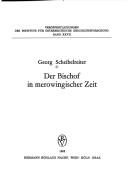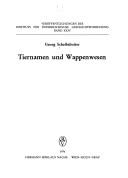| Listing 1 - 10 of 21 | << page >> |
Sort by
|

ISBN: 3205085337 9783205085331 Year: 1983 Volume: 27 Publisher: Wien: Böhlaus,
Abstract | Keywords | Export | Availability | Bookmark
 Loading...
Loading...Choose an application
- Reference Manager
- EndNote
- RefWorks (Direct export to RefWorks)
Christian church history --- anno 500-799 --- Bishops --- Evêques --- History --- Histoire --- -Archbishops --- Clergy --- Major orders --- Metropolitans --- Orders, Major --- Chaplains, Bishops' --- Episcopacy --- History. --- -History --- Evêques --- Archbishops --- Bishops - History
Book
ISBN: 3896782177 9783896782175 Year: 1999 Publisher: Darmstadt: Primus,
Abstract | Keywords | Export | Availability | Bookmark
 Loading...
Loading...Choose an application
- Reference Manager
- EndNote
- RefWorks (Direct export to RefWorks)
Civilization, Medieval --- Civilization, Germanic --- Civilisation médiévale --- Civilisation germanique --- Europe --- Rome --- History --- Histoire --- Germanic peoples --- Ethnology --- -Psychological aspects --- Germanic peoples. --- Psychological aspects. --- Civilisation médiévale --- Civilization, medieval --- Civilization, medieval - Psychological aspects --- Ethnology - - Rome --- -Civilization, Medieval --- -Civilization, medieval --- Ethnology -
Book
ISBN: 9783205786801 9783486589351 9783205783190 3205783190 3205786807 3486589350 Year: 2009 Volume: 53 Publisher: Wien: Böhlau,
Abstract | Keywords | Export | Availability | Bookmark
 Loading...
Loading...Choose an application
- Reference Manager
- EndNote
- RefWorks (Direct export to RefWorks)
This study takes as its point of departure the diet in the summer of the year 1579 in Vienna. Leonhard von Harrach, Privy Councellor of Emperor Rudolf II, negotiated with leaders of the oppositional protestant nobility, who wanted to push through freedom of religious confession in the landesherrlichen cities and market towns in Lower Austria. Analysis of Harrachs's connections to opposition, his scope of action as a member of the government, councellor and mentor of the young, Spanish-catholic oriented Kaiser, professional court politician, nobleman, leader of an Austrian power elite, head of the 'House of Harrach' and a Catholic interested in reaching reconciliation with the protestants, can show the special structures of this conflict. The historiographic basis had largely to be assembled from scratch since, e.g., in recorded histories and chronics very little mention is made of an Austrian power elite within the Habsburg monarchy of the 16th century, which consisted of land-owning noblemen. The existence of this power elite has considerable consequences in gaining a proper understanding of the 'dualism' of Ständestaat as a complex dualistic system of political cooperation in the Habsburg monarchy. This power elite of functionaries from the lower nobility had a strong position in court and administration and also in estates in the Eastern hereditary lands of the Habsburgs. Noble families such as the Roggendorf, Jörger, Hoffmann, Windischgrätz or Khevenhüller, all in the same social network as Harrach, were among the most prominent families to profit from the more central organization of the state and at the same time they produced the most important leaders of the protestant opposition in Vienna and Graz. Although the conflict culture of the dualistic system wasn't strong enough against confessional polarization, the cooperation of the Habsburg dynasty with the court-oriented nobility from the provinces of the hereditary lands proved to be such a successful model of governmental organization that in the Austrian-Bohemian 'Dyarchy' it was continued on a larger scale. Skills of power elite made it possible to Harrach and his friend and relative Jörger, leader of the opposition, to employ a form of crisis management to moderate the oppositions after 1580. But the polarization of religious confessions had destroyed the Irenic of Harrach. His initiation into the Spanish-catholic Habsburg Order of the Golden Fleece gave the decisive impulse, to take on, along with the Archduke Ernst, the overall direction of moderate, but compulsory re-Catholization of the Lower-Austrian cities and market towns, organized by Melchior Khlesl, official of the Bishopric Passau in Vienna.
Nobility --- Harrach, Leonhard von, --- Rudolf --- Austria --- Politics and government --- Heraldry --- History --- Europe --- Héraldique --- History. --- Histoire --- Genealogy --- Généalogies --- 943.6.05 --- 943.6.05 Geschiedenis van Oostenrijk: Habsburgers: Ferdinand I tot Karel VI--(1526-1740) --- Geschiedenis van Oostenrijk: Habsburgers: Ferdinand I tot Karel VI--(1526-1740) --- Heraldry - Europe - History --- Europe - Genealogy - History
Book
ISBN: 9783863120252 Year: 2014 Publisher: Darmstadt Primus Verlag
Abstract | Keywords | Export | Availability | Bookmark
 Loading...
Loading...Choose an application
- Reference Manager
- EndNote
- RefWorks (Direct export to RefWorks)
929.6 --- 929.6 Heraldiek. Wapenkunde --- Heraldiek. Wapenkunde --- Genealogy. Heraldy
Book
Year: 2004 Publisher: Darmstadt Wissenschaftliche Buchgesellschaft
Abstract | Keywords | Export | Availability | Bookmark
 Loading...
Loading...Choose an application
- Reference Manager
- EndNote
- RefWorks (Direct export to RefWorks)
Book
ISBN: 3896782576 Year: 2004 Publisher: Darmstadt Primus
Abstract | Keywords | Export | Availability | Bookmark
 Loading...
Loading...Choose an application
- Reference Manager
- EndNote
- RefWorks (Direct export to RefWorks)
Civilization, Medieval --- Crusades --- Kings and rulers, Medieval --- Middle Ages --- Historiography --- Europe --- Church history --- History

ISBN: 3205085094 9783205085096 Year: 1976 Publisher: Wien Böhlau
Abstract | Keywords | Export | Availability | Bookmark
 Loading...
Loading...Choose an application
- Reference Manager
- EndNote
- RefWorks (Direct export to RefWorks)
Animals --- Heraldry --- Names, Personal --- Folklore --- History --- Animals. --- Animaux --- Dierennamen. --- Dierensymboliek. --- Heraldry. --- Héraldique --- Middeleeuwen. --- Names, Personal. --- Noms de personnes. --- Wapens (heraldiek). --- History. --- Histoire.
Book
Year: 1976 Publisher: Wien, Köln, Graz Böhlau
Abstract | Keywords | Export | Availability | Bookmark
 Loading...
Loading...Choose an application
- Reference Manager
- EndNote
- RefWorks (Direct export to RefWorks)
Article
Abstract | Keywords | Export | Availability | Bookmark
 Loading...
Loading...Choose an application
- Reference Manager
- EndNote
- RefWorks (Direct export to RefWorks)
Book
Year: 1999 Publisher: Darmstadt : Wissenschaftliche Buchgesellschaft (WBG),
Abstract | Keywords | Export | Availability | Bookmark
 Loading...
Loading...Choose an application
- Reference Manager
- EndNote
- RefWorks (Direct export to RefWorks)
| Listing 1 - 10 of 21 | << page >> |
Sort by
|

 Search
Search Feedback
Feedback About UniCat
About UniCat  Help
Help News
News